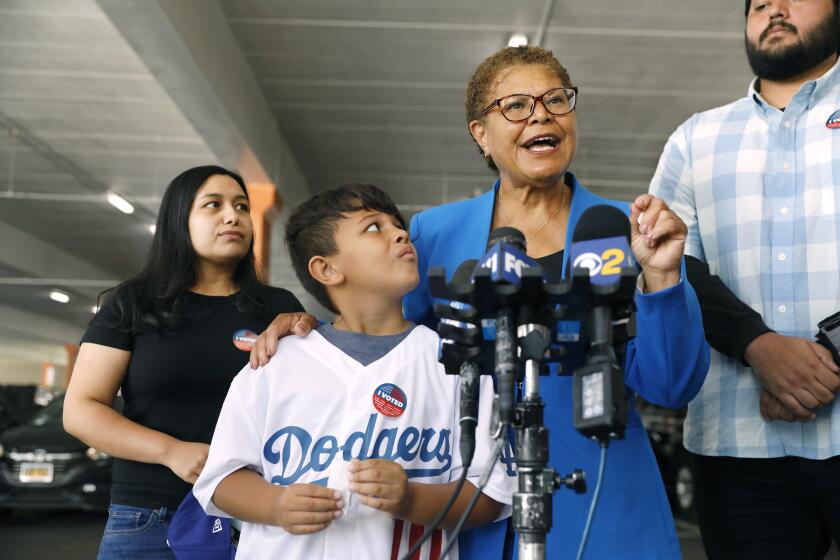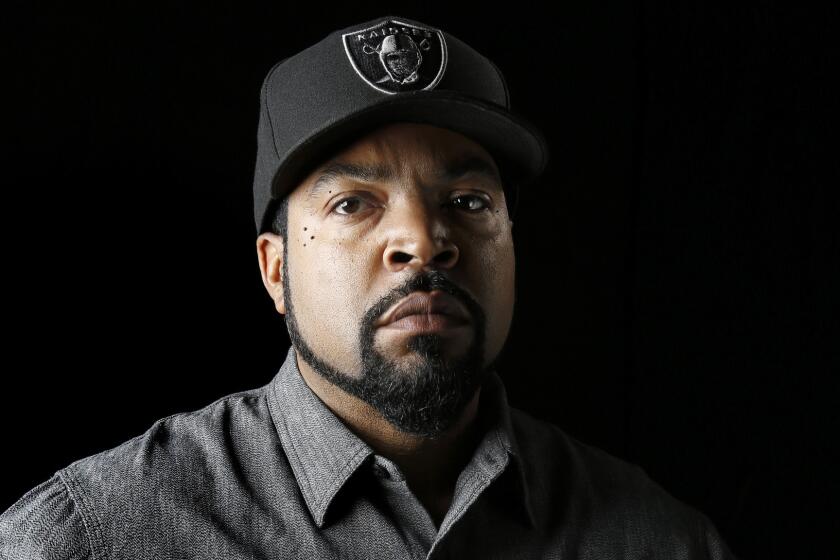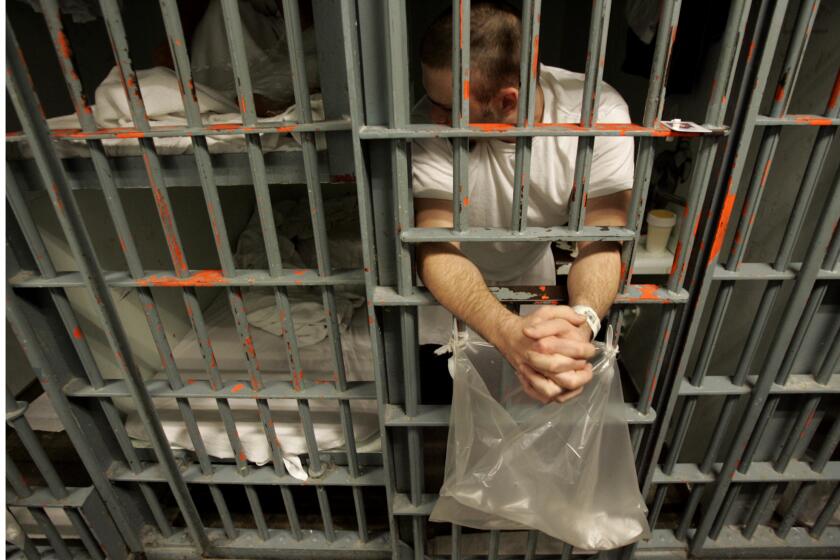Column: These Black men say they’ll vote for Caruso, not Bass. Is it the ‘Ice Cube effect’?
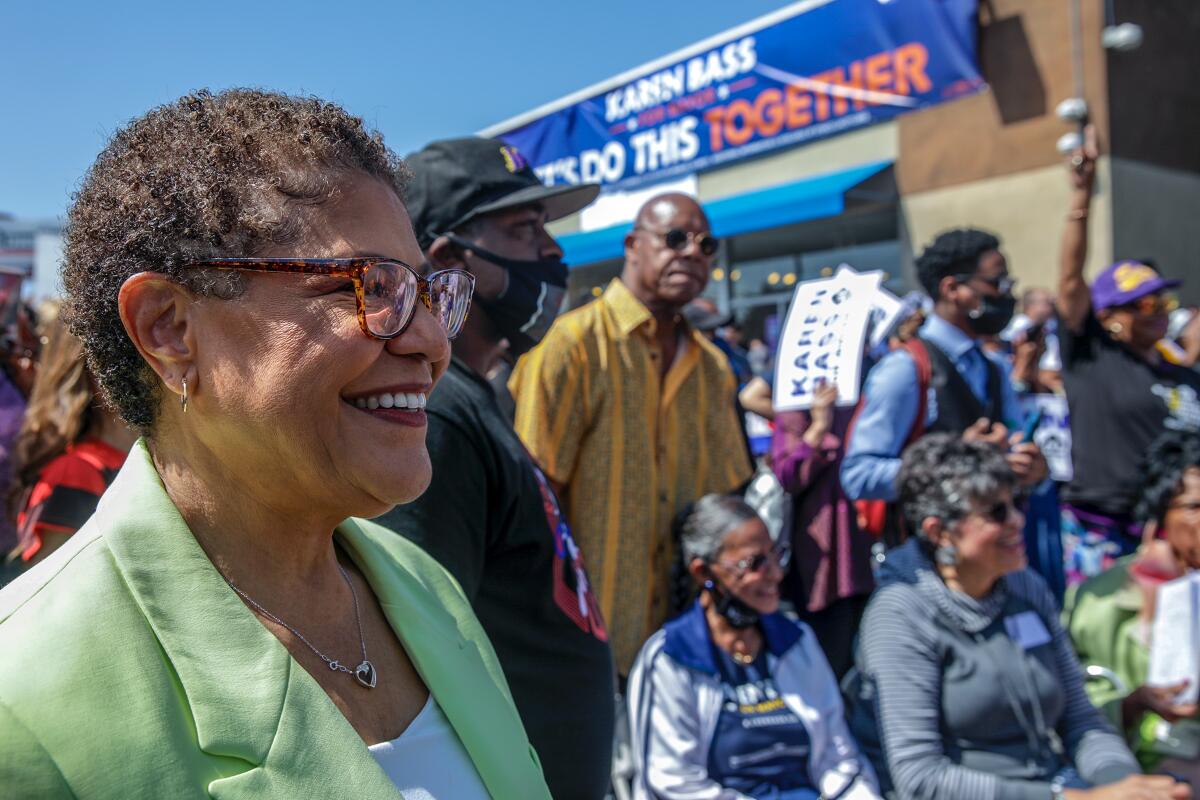
In retrospect, I missed the first sign that L.A. mayoral candidate Rep. Karen Bass might have some trouble hanging onto support from Black men.
It came in the middle of May, when legendary Long Beach rapper Snoop Dogg decided to reach out to her main opponent, the billionaire developer and former Republican Rick Caruso, and offer up his endorsement.
“You got my support,” he told Caruso over Zoom, TV news cameras documenting the exchange. “We’re a part of whatever you’re a part of, as far as bringing love to the community.”
A few days later, there was another sign. I missed that one, too.
Clarence Avant, the revered music industry mogul who introduced then-Sen. Barack Obama to Southern California’s political and entertainment circles, also endorsed Caruso. The 91-year-old, whose wife, Jacqueline, was murdered last year during an invasion of their Beverly Hills home, left it to the candidate to break the news.
“I am humbled and grateful to have his support,” Caruso told The Times.
Weeks later, it’s now clear that these two Black men have plenty of company.
A new poll of likely voters, conducted by the UC Berkeley Institute of Governmental Studies and sponsored by the Los Angeles Times, found that roughly half of Black men plan to vote for Caruso in Tuesday’s primary election. In fact, of all the men surveyed, Black men were most likely to support him.
It’s somewhat surprising — and as a Black woman, more than a little mystifying — given the years Bass spent working in the Black and Latino neighborhoods of South L.A. and serving as one of the two Black members of the city’s congressional delegation.
Bass takes small edge in final pre-primary poll, but neither candidate seems likely to hit the 50% in Tuesday’s primary needed to win outright.
Of course, it’s not written in stone somewhere that all Black people must vote for Black candidates. Plenty of Black men and women surely support Caruso for their own sound policy reasons — maybe even Snoop Dogg, certainly Clarence Avant.
We are not a monolith, after all. I mean, just look at Larry Elder.
But in this liberal city in this very liberal state, it’s also true that Caruso is the most conservative candidate running for mayor and that many of his proposals — though responding to genuine problems and public anger — run counter to what most Black Angelenos have long said they wanted.
Caruso, for example, favors a return to some of the disastrous tough-on-crime strategies of the past, locking up more people and moving away from criminal justice reform. He wants to add 1,500 officers to the Los Angeles Police Department and has been endorsed by former LAPD Chief William J. Bratton — he of broken-windows policing infamy.
On homelessness, Caruso wants to quickly clear a lot more encampments, which Black men disproportionately occupy thanks to decades of systemic housing discrimination.
He has made big promises to build more shelters and housing, both of which are easier said than done. But if encampments are cleared when there aren’t enough beds available, he has the legally dubious suggestion of moving some homeless people into tent camps, modeled after one built to house undocumented migrant children in Texas.
Compare that with Bass, whose proposals on public safety and homelessness are less extreme, but are far more realistic, sophisticated and considerate of poor people of color.
Indeed, this is why many political observers assumed she would have the backing of most Black voters in L.A. if she ran for mayor. Instead, despite strong and consistent support from Black women, the poll found an erosion among Black voters overall, led by men.
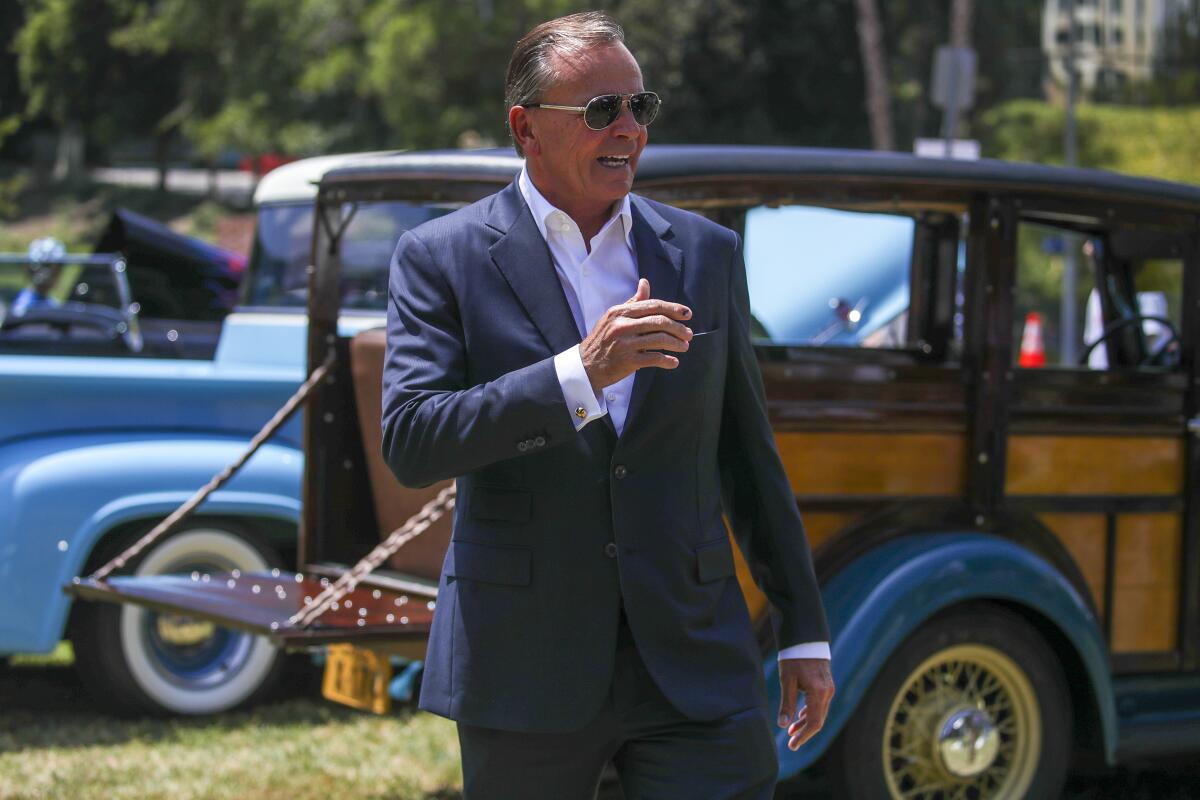
The question is why.
Is it just sexism? Or perhaps a related desire to uphold the patriarchy, given that Bass would be the first woman to be mayor of L.A.?
It can’t be racism.
No, I believe the answer has to do with what I’m calling the “Ice Cube effect.”
If you’ll recall, shortly before the 2020 presidential election, the Los Angeles rapper helped draft a progressive plan for Black America. He tried to get the Biden-Harris campaign to adopt it, and was told to wait.
And so, driven by good intentions and hubris, he talked with Trump administration officials about the plan instead, drawing an avalanche of criticism, especially from Black women appalled that he would even consider working with them.
Ice Cube explained that, although he hadn’t paid attention to politics in a long time, he acted because Democrats weren’t doing anything to help Black men and, therefore, didn’t deserve any loyalty for votes if Republicans were willing to do better.
“Every side is the Darkside for us here in America,” he put it at the time. “They’re all the same until something changes for us. They all lie and they all cheat.”
I heard a similar sort of logic when I went to Leimert Park over the weekend to try to understand the apparently lagging support for Bass.
I was hoping to talk to Black men who planned to cast their ballots for Caruso. Instead, I found a bunch of irritated Bass voters who nevertheless understood why their fellow Black men would do such a thing.
They told me many Black men are disillusioned and fed up with status quo. They don’t believe another politician can fix anything in Los Angeles. So why not give Caruso a shot?
Some Black men, they said, are naive about the complexities of city politics and don’t understand that Caruso’s promises on homelessness and the economy won’t be easy or quick to implement — if they happen at all.
Other Black men, they said, see ads on TV and Instagram — part of Caruso’s multimillion-dollar massive advertising blitz — and don’t know about his history on the Los Angeles Board of Police Commissioners or that he wants to add cops to the LAPD.
Black men can be sexist, too, they admitted. Some see Bass as “sweet” or “soft,” not “hard” enough to be mayor like a shrewd, wealthy developer steeped in deal-making. As one Black political insider put it: “Why are we going to vote for her? Because she’s a nice lady?”
And then there were the many other Black men I met who were completely disengaged from politics, to the point of not knowing there’s an election happening, much less who is on the ballot.
Some were like Willie, who told me he used to vote regularly, but stopped because he doesn’t believe a politician — any politician — can solve his problems.
Ice Cube’s thought process, an odd mix of obliviousness and entitlement, helps explain why Trump has an in with a demographic that should oppose him.
“You can work and your wife can or your child can work. The dogs can work. The rats and the roaches even working, and you still cannot afford to stay in a studio apartment in South Los Angeles,” he told me, taking a break from selling used DVDs and books out of his minivan.
He continued, his voice rising: “And when was the last time you heard a politician say ‘Black man’? When they think of the Black community, they think of Black women or Black children. They don’t really think of us.”
Willie ran through a list of government assistance programs, from tax credits to food benefits for infants, arguing that they primarily benefit women. Meanwhile, single Black men are disproportionately homeless and politicians “don’t care.” This is why, he speculated, that Black men vote differently than Black women.
“But that’s OK,” he spat, shaking his head in resigned anger.
On Sunday, the Bass campaign didn’t respond to a request for comment about the new poll. Statistically, the trend-line on Black men, while a bit embarrassing, isn’t a serious problem for her in the primary.
Black voters only make up a mere 13% of the electorate in Los Angeles. And heading into the official close of voting on Tuesday, Bass is leading Caruso in the polls overall, 38% to 32%, signaling that there will be a November runoff.
In many ways, though, this is a race that’s bigger than just Los Angeles. How Angelenos vote for mayor is sure to have national implications on issues ranging from criminal justice reform and policing, to housing and homelessness.
How we vote also will provide a window into how some of the larger problems within the Democratic Party are likely to shake out in the coming years.
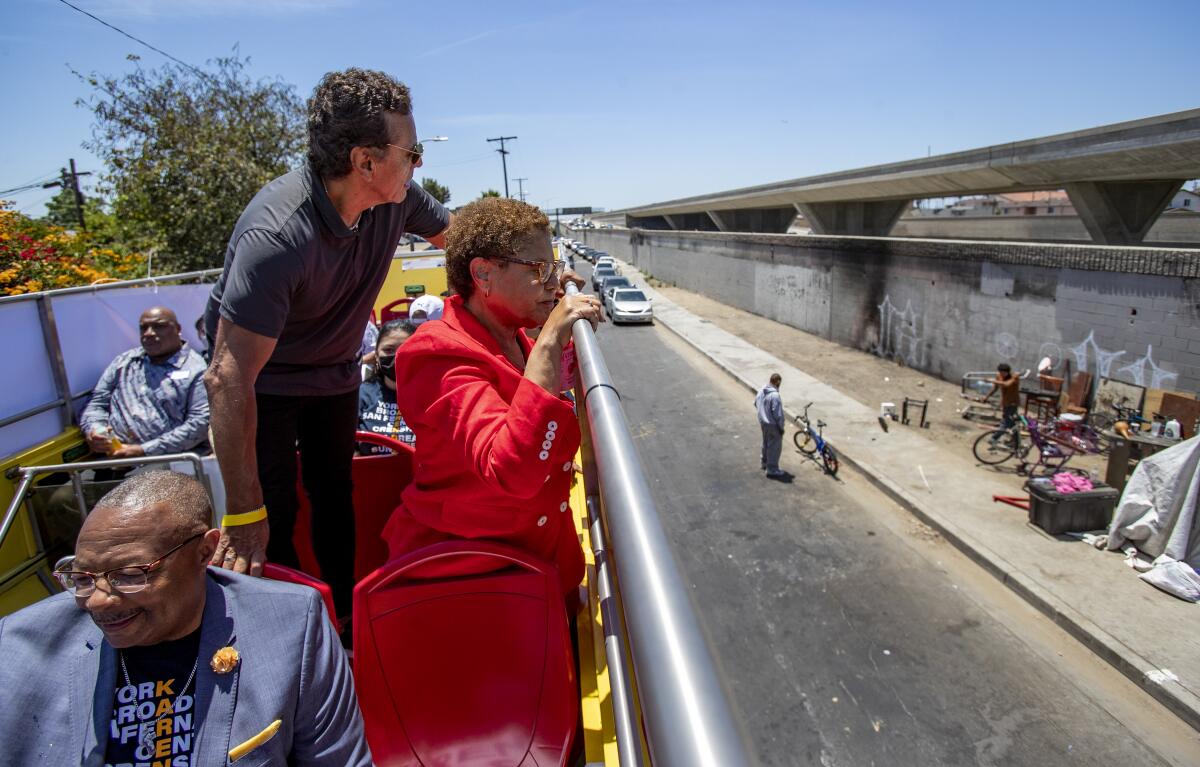
In 2020, Black voters were the difference between a second term for Donald Trump and a first-term for Joe Biden, the difference between a slim majority in Congress and Republicans running the show.
As the midterms approach, given the partisan brinkmanship and collapse of so many Democratic priorities in Congress, including the police reform effort that Bass helped lead, there are fresh fears that Black voters won’t return in similar numbers — this year or in 2024.
More on the mayoral race
Indeed, a recent Gallup poll found that Biden’s approval rating among Black adults was 67%, down 20 points from the beginning of his presidency. Younger voters and Latinos aren’t really feeling the current administration either, setting off even more panic among Democrats.
Then again, it’s just a poll.
Exit polling from the 2020 election indicated more Black men defected to Trump. That turned out to be more hype than reality — and the poll numbers ahead of the primary in this mayoral race could be as well.
Black women have long been thought of as the backbone of the Democratic Party. We are the influential if relatively small percentage of the population — especially in California — credited with delivering voters to deliver elections.
Now, perhaps it’s Black men who are becoming the bellwether of the Democratic Party.
Because if you can’t convince a majority of liberal Black men in an overwhelmingly blue city like L.A. to vote for the former head of the Congressional Black Caucus, what hope do Democrats have in red and purple states?
That’s the “Ice Cube effect.”
More to Read
Sign up for Essential California
The most important California stories and recommendations in your inbox every morning.
You may occasionally receive promotional content from the Los Angeles Times.
